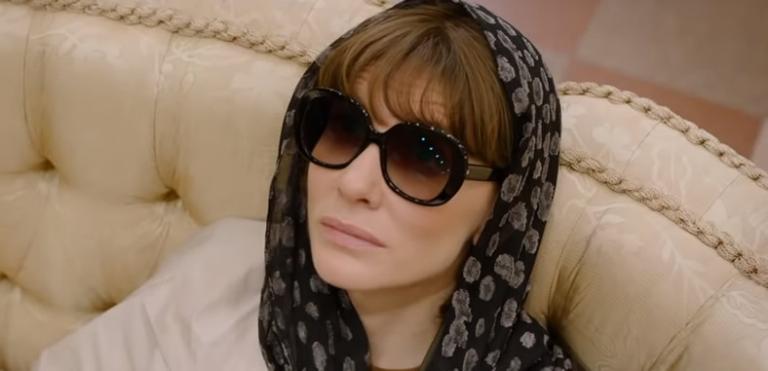
My favorite quote from Where’d You Go, Bernadette? isn’t from the movie at all. Rather, it’s from the 2012 novel of the same name by Maria Semple. She writes:
“Maybe that’s what religion is, hurling yourself off a cliff and trusting that something bigger will take care of you and carry you to the right place.”
In the film, Bernadette (played by Cate Blanchett) has gone off a cliff.
She was once a brilliant, rising architect. Her husband, Elgie (Billy Crudup), once gave her a medallion of her namesake, St. Bernadette, who was said to have received 16 visions, or “miracles.” Our Bernadette, Elgie insists, also has received miracles: Her first two were Bernadette’s groundbreaking architectural designs.
But the other 14 miracles were wrapped up in their daughter, Bee (Emma Nelson). Born with a serious heart condition, Bee shouldn’t have lived—much less lived to become a young, vibrant teen with a passion to see Antarctica. She’s crazy-close with her mom, too.
These days, she’s about the only one who is.
Bernadette stopped designing buildings long ago. A crushing setback brought her career to a sudden, screeching halt. She could’ve gone back after the hurt stopped, but by that time her husband had a great career of his own at Microsoft. And, well, there was Bee to think of. Bernadette threw herself into homemaking and motherhood. And that was fine.
But maybe it wasn’t fine. By the time Bee talks she and Elgie into a family trip to Antarctica, Bernadette’s a very different person than when Bee was born, jagged and jaded. She can’t sleep. She rarely leaves the house and can barely conceive of going to Antarctica, what with the boat’s cramped quarters and rocky waves and (ugh) all the other travelers on board. People seem just a collection of inconveniences: The only person she talks with is her long-distance personal assistant, Manjula—and that’s only by text or email. And while she’s been prescribed plenty of medication for her mental distress, she’s stopped taking her pills and instead pours them into a big bottle. Bernadette says she likes the colors.
Bee fiercely defends her mother from all critics, despite her eccentricities. But Elgie sees the woman he married slipping into a maelstrom of mental illness and bad decisions, and he holds an intervention for her. An FBI agent is there to tell her just how bad her decisions have been. A psychiatrist insists to her that she skip the family trip to Antarctica and instead should go to a clinic for some intensive care. But Bernadette comes up with a third option: She retreats to the bathroom, opens a window and … runs away. She heads to Antarctica—a place she never wanted to go.
Bernadette has hit rock bottom. Maybe it’s only appropriate that she heads to the bottom of the planet to find herself again.
Where’d You Go Bernadette?, outside its references to the saint (and to the fact that Bernadette and her family live in an old Catholic boarding school), isn’t overtly religious. But it’s deeply spiritual. It even has a whiff of Dante’s Divine Comedy about it. Dante begins Inferno (the first book in the comedy) with this:
Midway upon the journey of our life
I found myself within a forest dark,
For the straightforward pathway had been lost.
Like Dante, Bernadette is midway through her life. Like Dante, her pathway was lost: The forest presses in on her. And like Dante, Bernadette must leave the home and family she loves, and the world she’s always known, and face a strange, impossibly difficult season.
In Inferno, Dante must go to the ninth circle of Hell before he can start to find his way back to redemption: A place where tears freeze before they can fall. Bernadette must go to the South Pole, and there find her own redemption.
In my Plugged In review, I suggested that Where’d You Go Bernadette? is a study in spiritual purpose: “the tension between what we feel we’re called to do and what we’re asked to do,” I write. Bernadette was (spiritually speaking) given a gift—an ability to create wonderful buildings. And as a friend of her tells her, “People like you must create. If you don’t, you become a menace to society.” But that calling in no way diminishes the love she feels, or the sacrifices she’s made, for her family. To sacrifice for others, that too is what we’re called to do. And many of us make peace with calling and duty in various ways. Artists paint before picking kids up from piano lessons. Poets write in the wee hours of the morning. Creators—and I consider myself one—often find ways to create, even if it’s not on the scale or scope we once imagined. It’s not the adulation that matters: It’s the act of creation—to scratch that itch that God gave us—that’s important.
But the film comes with another spiritual aspect, too: That act of leaping off a cliff and trusting that you’ll be caught.
In some ways, I resist this characterization of faith. Belief in a loving, engaged God, I insist, is reasonable. No, there are no irrefutable proof such a God exists; that’s why it’s called faith. But I do have evidence. As an old pastor often said, we inherently put our faith in a chair, but only because it looks solid enough to hold us. Likewise, we put our trust in God because we find Him trustworthy. But testing that trust—by, say, leaping off a literal cliff—seems less like faith and more like stupidity.
But Bernadette’s spiritual journey—a journey that takes her to the ends of the earth and back to calling and meaning, to rediscovering her creative purpose and rekindling her joy in her family—has biblical precedence. Moses wandered the wilderness. Jonah landed in a big fish. David fell in with the Philistines. All were thrown from their homes in one way or another. They needed to leave so they could find what meaning really meant again.
Seems strangely appropriate that, in the movie, Bee never loses hope or faith in her mother—following her like God followed Moses and Jonah and David, and how He pursues us.
And while the movie never tells us what “Bee” might be short for, the name seems strangely appropriate. Bee is, after all, sometimes an abbreviation for Beatrice—Dante’s angelic guide through limbo and heaven, and a representation of spiritual love.
The key question in Where’d You Go, Bernadette? Isn’t necessarily the one asked in the title. Rather, it’s what caught her there, and what carried her to the right place.












